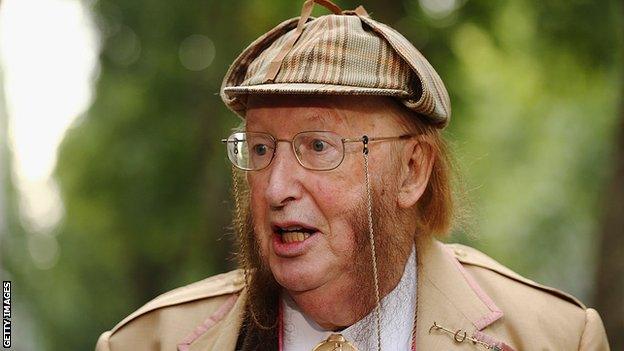John McCririck: Legendary racing pundit dies aged 79
- Published

McCririck was an award-winning journalist and broadcaster
Legendary racing pundit John McCririck, who for many years was the face of British horse racing, has died at a London hospital on Friday aged 79.
McCririck made his career as the face of Channel 4's racing coverage, famous for his loud, eccentric style and his signature deerstalker hat.
He also appeared on reality TV shows such as Celebrity Big Brother, Celebrity Wife Swap and Celebrity Coach Trip.
He is survived by his wife Jenny.
His family said he had been ill in recent months but continued to make several TV and radio appearances.
Tributes are being paid to John by figures from the worlds of racing and entertainment.
"Very sad to hear the news of John McCririck's passing - one of the most recognisable faces from the world of horse racing and a great at promoting our sport," tweeted, external 20-time champion jockey AP McCoy.
Three-time champion jockey Frankie Dettori, 48, said he first met McCririck as a 16-year-old apprentice and the broadcaster was "a big part of my racing life."
"He was very flamboyant and controversial but I always got on really well with him," said Dettori.
"He did put on a bit of a show but underneath it all he worked very hard and he was very knowledgeable about racing."
The British Horseracing Authority also paid tribute, saying: "Throughout a lengthy & colourful career one thing was always clear - his enduring passion & love for the sport of horseracing. He was a recognisable figure and resonated with the wider public."
Ascot Racecourse tweeted: "He was an unmistakable presence in racing, and one of the most impactful broadcasters of his generation."
Broadcaster Nick Luck, a former Channel 4 colleague, added: "Life without John McCririck will be far less interesting - he was a magnificent journalist first and a great showman. So often very kind to me and many, many others."
McCririck worked for BBC Sport early in his career as a sub-editor on Grandstand when the programme was presented by the likes of Frank Bough and Des Lynam.
He went on to write for The Sporting Life where he won British Press Awards 'Specialist Writer of the Year' and 'Campaigning Journalist of the Year'.
McCririck's profile grew when he energised racing broadcasts with lively updates from the betting ring, where he was not afraid to berate punters playing the fool in the background.
When he was axed by Channel 4 in 2012, he launched a claim for age discrimination.
"I have put my own personal future on the line," he said. "But I think it's so important for people in their 30s up to their 70s who fear anonymous suits and skirts coming along and getting rid of them."
He lost the case, and with it a significant amount of money, although he became a regular on reality TV shows.
McCririck would make disparaging remarks about his wife Jenny, nicknaming her 'The Booby', but in truth they were a strong and happy couple.
"It's all a pantomime. Do I look like someone who is downtrodden?" said Jenny.
McCririck was still a regular sight - often smoking a fat cigar - at big race meetings in recent years although ill health meant he missed the Epsom and Royal Ascot fixtures last month.
Viewers were shocked when he appeared frail and gaunt during one broadcast, although he retained his humour and ability to generate debate throughout.
'One of the most familiar faces on British television'
Cornelius Lysaght, BBC horse racing correspondent
With a trademark deerstalker hat, his side whiskers and his waving arms plus a booming voice, McCririck became one of the most familiar faces on British television.
A former bookmaker and award-wining journalist, his career took off as the betting specialist on Channel 4 Racing from the mid-1980s.
He brought to wider audiences the secret 'tic-tac' communication system of the racecourse betting ring, with its unique terms including 'Burlington Bertie 100 to 30' and 'Double Carpet 33 to 1'.
With his controversial views - particularly what was seen as a sexist attitude towards women including his wife Jenny - McCririck was dropped by Channel 4 in 2012.
Latterly, he made only occasional TV and media appearances but lost none of his flamboyance.
I have lost count of how many times people have come up to me and said 'do you know that mad guy with the whiskers who waves his arms around and shouts on the TV at the races - what's he really like?'
The answer was that he was a complex character: a colourful pundit and showman who brought horse racing to a wider audience, but also courted controversy of course. He was a campaigning punters' champion and a generous and supportive colleague.
He was practically the definition of the expression 'one-off'.